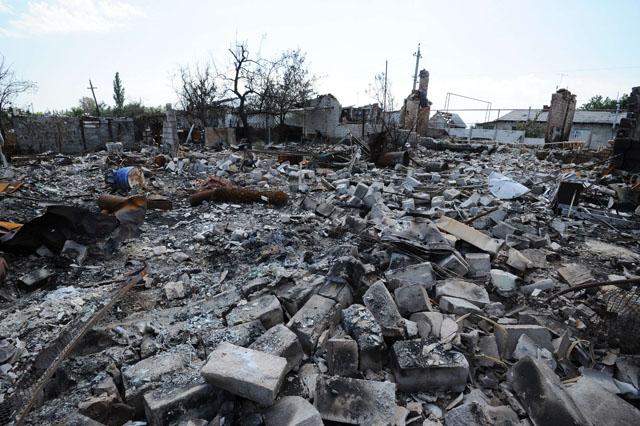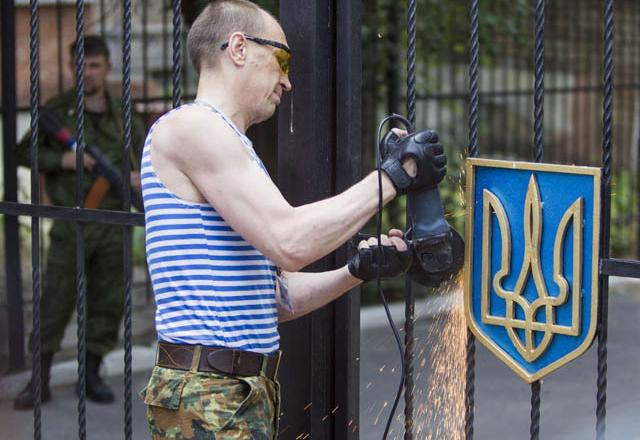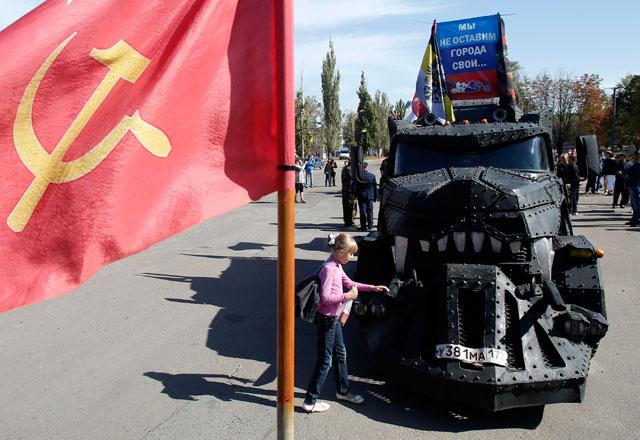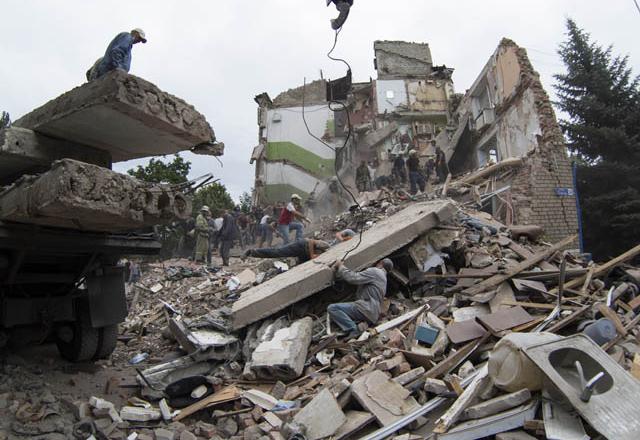You are here
Refugees flee Ukraine rebel bastions fearing revenge assault
By AFP - Jul 12,2014 - Last updated at Jul 12,2014

DONETSK, Ukraine — Panicked refugees flooded highways and packed trains heading out of the main remaining rebel strongholds in eastern Ukraine on Saturday fearing an attack by government forces who lost 30 servicemen to defiant militants.
Separatists killed 19 troops in a hail of heavy rocket fire on Friday near the Russian border in a bloody reminder of their resolve to reverse the recent tide of government gains across the east of the country.
The military said four other troops died elsewhere on Friday and seven more were killed overnight in attacks that also left more than 120 soldiers wounded.
Ukraine’s new Western-backed leader vowed to step up the push east and take revenge on the militias responsible, which could shatter all hopes of a truce.
“The rebels will pay for the life of every one of our servicemen with tens and hundreds of their own,” President Petro Poroshenko told an emergency security meeting.
The militant talk convinced many in the million-strong eastern industrial hub of Donetsk — where gunmen who have been abandoning surrounding cities since last weekend have been retreating — that their city was about to be bombed.
The local mayor rushed out to meet Poroshenko on Friday to discuss measures that could “avoid bloodshed, and the use of air strikes and heavy artillery”.
But separatists in control of Ukraine’s coal mining capital said locals were not taking any chances after three months of fighting that has claimed 550 lives and sparked the worst East-West stand-off since the height of the Cold War.
Rebel commander Igor Strelkov told reporters that a “spontaneous evacuation” was also under way in the neighbouring separatist bastion of Lugansk.
“I would say that one car in five is filled with refugees,” said a young separatist volunteer manning a roadblock around 20 kilometres east of Donetsk.
‘Kremlin puppets’
Political talk shows in the city on Friday were filled with people questioning tactics, and demanding to know why most of the rebels were allowed to slip out of the towns and cities they had abandoned in recent days.
Poroshenko had last Saturday proclaimed the seizure of Slavyansk — the symbolic heart of the uprising — a turning point in a conflict set off by the ousting in February of Ukraine’s former Kremlin-backed president, Viktor Yanukovych, and Russia’s subsequent seizure of Crimea.
In a rare move, EU leaders this weekend joined Russia in trying to dampen Kiev’s newfound bravado and convince Poroshenko to launch direct truce talks with the separatists.
The EU said Saturday that it was also adding 11 separatist leaders to the names of 61 Russians and pro-Kremlin Ukrainians blacklisted for their roles in enflaming the conflict.
But Poroshenko’s top aide said that all talks with the rebels were off.
“Those who call themselves leaders of the People’s Republics of Donetsk and Lugansk are nobodies — they are puppets, servants of the Kremlin,” presidential administration chief Yuriy Lutsenko told Kiev’s Inter television.
“The only possible side that can be involved in negotiations is Russian President Vladimir Putin,” he said.
The possibility of such talks being held as early as Sunday emerged when the Brazilian government said the Ukrainian leader had accepted an invitation to attend the World Cup football final in Rio de Janeiro, where Putin will also be present.
Poroshenko’s office could not immediately confirm the announcement.
Poroshenko’s security headaches have been compounded by the threat of Ukraine going bankrupt if it fails to quickly adopt deeply unpopular austerity measures demanded under the terms of an emergency Western bailout deal.
An International Monetary Fund (IMF) team was due to leave Kiev on Saturday after checking whether Ukraine had done enough to merit the second tranche of a $17 billion (12.5 billion euro) loan as part of a broader $27 billion international package.
Standard and Poor’s delivered a rare dose of good news to Poroshenko by revising to “stable” from “negative” Ukraine’s credit rating based on the conviction that the IMF would not abandon Kiev at this stage.
“Full disbursement of the IMF programme and related multilateral lending should enable Ukraine to meet its external financing needs over the next year,” S&P said.
The two-year international programme is meant to make up for a $15 billion package Russia had extended to former president Yanukovych for his November decision to ditch a historic EU trade and association pact.
His overthrow and the new government’s signature of the European deal helped provoke the ongoing insurgency that saw Russia withdraw its aid.
Related Articles
Ukraine launched delicate dual-track diplomatic negotiations with Russia on Monday aimed at averting a debilitating gas cut and ending a bloody separatist insurgency by the end of the week.
Heavy fighting erupted around the rebel stronghold of Donetsk in eastern Ukraine on Sunday, piling further pressure on a precarious nine-day-old truce between the government and separatist fighters.
Ukraine’s Western-backed leaders on Tuesday invited pro-Kremlin insurgents to a videoconference aimed at halting spiralling violence and what Kiev warned was an imminent invasion by thousands of Russian troops.

















